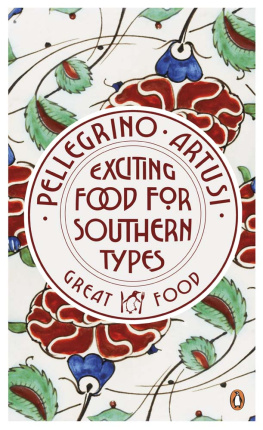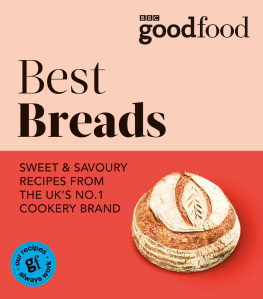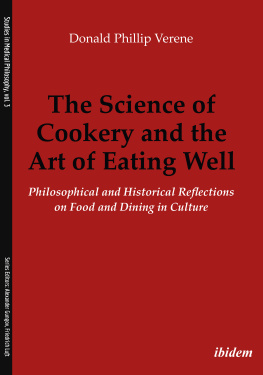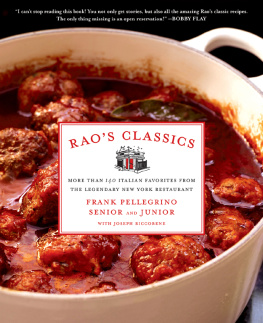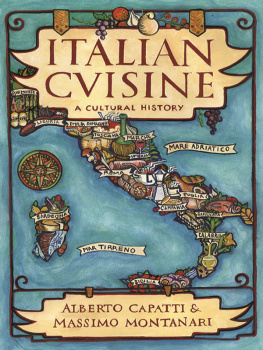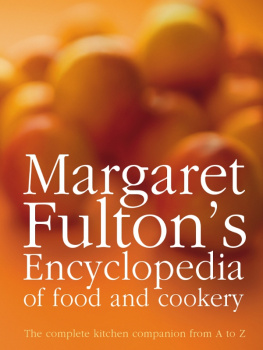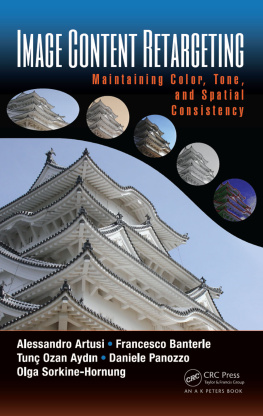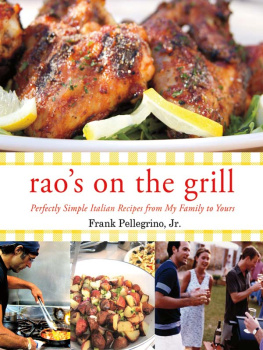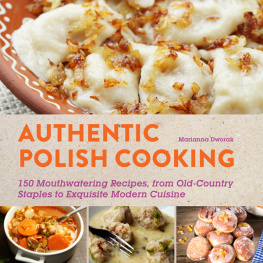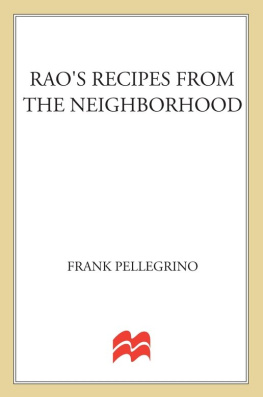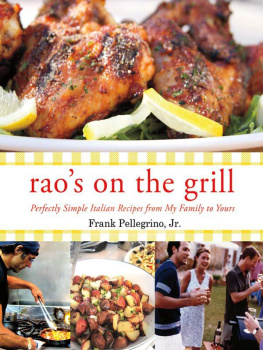Exciting Food for Southern Types
PELLEGRINO ARTUSI
PENGUIN BOOKS
PENGUIN BOOKS
Published by the Penguin Group
Penguin Books Ltd, 80 Strand, London WC2R 0RL, England
Penguin Group (USA) Inc., 375 Hudson Street, New York, New York 10014, USA
Penguin Group (Canada), 90 Eglinton Avenue East, Suite 700, Toronto, Ontario, Canada M4P 2Y3 (a division of Pearson Penguin Canada Inc.)
Penguin Ireland, 25 St Stephens Green, Dublin 2, Ireland
(a division of Penguin Books Ltd)
Penguin Group (Australia), 250 Camberwell Road, Camberwell, Victoria 3124, Australia
(a division of Pearson Australia Group Pty Ltd)
Penguin Books India Pvt Ltd, 11 Community Centre, Panchsheel Park, New Delhi 110 017, India
Penguin Group (NZ), 67 Apollo Drive, Rosedale, Auckland 0632, New Zealand
(a division of Pearson New Zealand Ltd)
Penguin Books (South Africa) (Pty) Ltd, 24 Sturdee Avenue, Rosebank, Johannesburg 2196, South Africa
Penguin Books Ltd, Registered Offices: 80 Strand, London WC2R 0RL, England
www.penguin.com
La scienza in cucina e larte di mangiare bene first published in Italy 1891
This translation, Science in the Kitchen and the Art of Eating Well, first published in the USA by Marsilio Publishers 1997
This extract published in Penguin Books 2011
Copyright University of Toronto Press, 2003
All rights reserved
Cover design based on a pattern from a bowl by Ulisse Cantagalli, Florence, 1892. Tin-glazed earthenware. (Photograph copyright Victoria & Albert Museum.) Picture research by Samantha Johnson. Lettering by Stephen Raw
Except in the United States of America, this book is sold subject to the condition that it shall not, by way of trade or otherwise, be lent, re-sold, hired out, or otherwise circulated without the publishers prior consent in any form of binding or cover other than that in which it is published and without a similar condition including this condition being imposed on the subsequent purchaser
ISBN: 978-0-14-196599-4
PENGUIN BOOKS GREAT FOOD
Exciting Food for Southern Types
PELLEGRINO ARTUSI (18201911) was an Italian businessman and gastronome. His working life as a silk merchant allowed him to acquire considerable wealth, which was used to fund his passions: literature and food. He self-published the famous Italian cookbook La scienza in cucina e l'arte di mangiare bene (The Science of Cooking and the Art of Eating Well) in 1891, and by the time of his death over 200,000 copies had been sold. Writing only two decades after the unification of Italy, Artusi was the first to include recipes from all regions of Italy in a single cookbook and helped establish a national Italian identity.
A Note
Cooking is a troublesome sprite. Often it may drive you to despair. Yet it also very rewarding, for when you do succeed, orovercome a difficulty in doing so, you feel the satisfaction of a great triumph.
Beware of books that deal with this art: most of them are inaccurate or incomprehensible, especially the Italian ones. TheFrench are a little better. But from either, the very most you will glean are a few notions, useful only if you already knowthe art.
If you do not aspire to become a premier cook, you need not have been born with a pan on your head to become a good one. Passion,care, and precision of method will certainly suffice; then, of course, you must choose the finest ingredients as your rawmaterials, for these will make you shine.
The best teacher is experience, under an adepts watchful eye. Yet even lacking this, with a guide such as mine, and devotionto your labors, you should be able, I hope, to put something decent together.
If at first you do not succeed, do not despair; with good will and persistence, you shall manage to make these dishes oneday, I guarantee it, and perhaps even to improve them. For I, after all, cannot presume to have reached the acme of perfection.
Yet I may discreetly assume that my dishes have been generally well received, and that to my great fortune few people, thus far, have cursed me for stomach aches or other phenomenathat decency forbids me to mention.
Finally, I should not like my interest in gastronomy to give me the reputation of a gourmand or glutton. I object to any suchdishonorable imputation, for I am neither. I love the good and the beautiful wherever I find them, and hate to see anyonesquander, as they say, Gods bounty. Amen.
From the Author to the Reader
Life has two principal functions: nourishment and the propagation of the species. Those who turn their minds to these twoneeds of existence, who study them and suggest practices whereby they might best be satisfied, make life less gloomy and benefithumanity. They may therefore be allowed to hope that, while humanity may not appreciate their efforts, it will at least showthem generous and benevolent indulgence.
The meaning contained in these few lines, which preface the third edition of this book, was better expressed in a letter to me by the celebrated poet, Lorenzo Stecchetti. It is my pleasure to transcribe them here:
The human race survives only because man possesses the instincts of self-preservation and reproduction, and keenly feels the need to satisfy both. The satisfaction of a need is always accompanied by pleasure. The pleasure of self-preservation lies in the sense of taste, and that of reproduction in the sense of touch. If man did not find food appetizing, or experience sexual desire, the human race would quickly come to an end.
Taste and touch are therefore the senses most necessary, indeed indispensable to the life of the individual and the species. The other senses are only there to help, and one can, after all, live life blind and deaf, but not without the functional activity of the organs of taste.
How is it, then, that on the scale of the senses, the two most necessary to life and its continuance are considered the basest? Why are those things that satisfy the other senses painting, music, etc. called art and deemed noble, while those that satisfy the sense of taste are considered ignoble? Why is a person who enjoys gazing at a lovely painting or listening to a beautiful symphony held in higher esteem than one who enjoys eating an excellent dish? Is the equality among the senses perhaps comparable to that among humans, whereby those who work may be well off, but those who do not are even better off?
The blame, no doubt, must lie with the tyrannical sway the brain now holds over all the organs of the body. In the time of Menenius Agrippa, the stomach ruled; nowadays it no longer even serves, or, if so, serves badly. Of all those who overwork their brains, is there a single one who can boast of good digestion? They are all nerves, neuroses, and neurasthenia. The height, chest-size, strength and reproductive powers of this ingenious, rachitic breed of sages and artists, all refinement and glands, are in daily decline. Indeed they do not even eat, but rather overstimulate themselves and keep going by dint of coffee, alcohol and morphine. Thus are the senses that direct the brains functions deemed nobler than those that preside over self-preservation and the time has come to right this unjust verdict.
God bless the bicycle, which lets us know the joys of a hearty appetite, notwithstanding all the decadent and decayed who dream of chlorosis, consumption and boils in the name of the ideal art! Let us go out, out into the open air, into the free-flowing, healthy air! It reddens the blood and strengthens the muscles! Let us not be ashamed, therefore, to eat the best we can and return gastronomy to its rightful place. In the end, even the tyrannical brain will be the better for it, and this nerve-wracked society will finally understand that, even in art, a discussion on how to cook eel is every bit as worthy as a disquisition on the smile of Beatrice.

